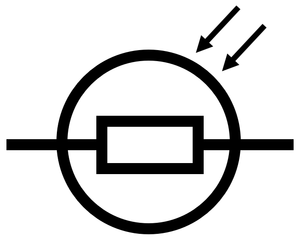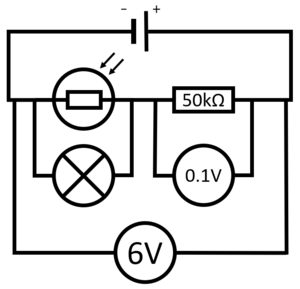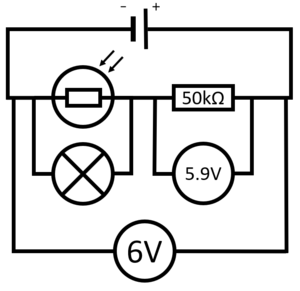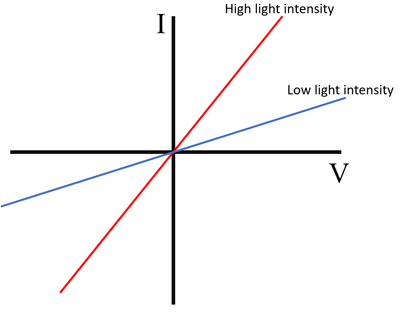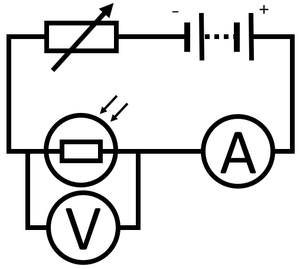Difference between revisions of "Light Dependent Resistor"
(Created page with "==Key Stage 4== ===Meaning=== right|300px|thumb|The symbol for a '''light dependent resistor'''. A '''light dependent resistor''' is...") |
|||
| (12 intermediate revisions by 2 users not shown) | |||
| Line 2: | Line 2: | ||
===Meaning=== | ===Meaning=== | ||
[[File:LightDependentResistorSymbol.png|right|300px|thumb|The symbol for a '''light dependent resistor'''.]] | [[File:LightDependentResistorSymbol.png|right|300px|thumb|The symbol for a '''light dependent resistor'''.]] | ||
| − | A '''light dependent resistor''' is a [[resistor]] which changes [[Electrical Resistance|resistance]] depending on the intensity of [[light]] that it is exposed to. | + | A '''light dependent resistor''' ('''LDR''') is a [[resistor]] which changes [[Electrical Resistance|resistance]] depending on the intensity of [[light]] that it is exposed to. |
===About Light Dependent Resistors=== | ===About Light Dependent Resistors=== | ||
| Line 9: | Line 9: | ||
: A '''light dependent resistor''' can be used to control the [[Potential Difference|potential difference]] of another [[Electrical Component|component]] in [[Series Circuit|series]] with it. If the [[light]] intensity on the '''light dependent resistor''' is decreased then the [[Potential Difference|potential difference]] across other [[Electrical Component|components]] will decrease. | : A '''light dependent resistor''' can be used to control the [[Potential Difference|potential difference]] of another [[Electrical Component|component]] in [[Series Circuit|series]] with it. If the [[light]] intensity on the '''light dependent resistor''' is decreased then the [[Potential Difference|potential difference]] across other [[Electrical Component|components]] will decrease. | ||
: '''Light dependent resistors''' can be used in security [[light]]s and street lamps which activate depending on how dark it is. | : '''Light dependent resistors''' can be used in security [[light]]s and street lamps which activate depending on how dark it is. | ||
| + | |||
| + | ===IV Graph=== | ||
| + | {| class="wikitable" | ||
| + | |- | ||
| + | |[[File:LDRPotentialDivider2.png|center|300px]] | ||
| + | |[[File:LDRPotentialDivider1.png|center|300px]] | ||
| + | |- | ||
| + | | style="height:20px; width:200px; text-align:center;" |In this [[Circuit Diagram|circuit diagram]] the [[light]] intensity is low, which causes the [[Electrical Resistance|resistance]] of the '''LDR''' to be high. As a result the [[Potential Difference|potential difference]] across the [[electrical Bulb|lamp]] will be high (5.9V) and the [[Electrical Current|current]] through the [[Electrical Bulb|lamp]] will be large. So in dim [[light]] the [[Electrical Bulb|lamp]] will remain lit. | ||
| + | | style="height:20px; width:200px; text-align:center;" |In this [[Circuit Diagram|circuit diagram]] the [[light]] intensity is high, which causes the [[Electrical Resistance|resistance]] of the '''LDR''' to be low. As a [[result]] the [[Potential Difference|potential difference]] across the [[electrical Bulb|lamp]] will be low (0.1V) and the [[Electrical Current|current]] through the [[Electrical Bulb|lamp]] will be low. So in bright [[light]] the [[Electrical Bulb|lamp]] will remain unlit. | ||
| + | |} | ||
| + | |||
| + | ===IV Graph=== | ||
| + | {| class="wikitable" | ||
| + | |[[File:IVGraphLDR.png|center|400px]] | ||
| + | |} | ||
| + | |||
| + | ====Description==== | ||
| + | The [[IV Graph]] for a [[Light Dependent Resistor|light dependent resistor]] shows that: | ||
| + | *At a high [[light]] intensity the [[Electrical Current|current]] increases rapidly with the [[Potential Difference|potential difference]] | ||
| + | *At a low [[light]] intensity the [[Electrical Current|current]] increases slowly with the [[Potential Difference|potential difference]]. | ||
| + | |||
| + | ====Explanation==== | ||
| + | : The [[Electrical Resistance|resistance]] of an '''LDR''' increases as the [[light]] intensity decreases. | ||
| + | |||
| + | ====Obtaining the IV Graph==== | ||
| + | {| class="wikitable" | ||
| + | |- | ||
| + | |[[File:LDRIVGraphCircuit.png|center|300px]] | ||
| + | | style="height:20px; width:300px; text-align:left;" | | ||
| + | #Connect an [[ammeter]] in [[Series Circuit|series]] with the '''LDR''' to measure [[Electrical Current|current]] through the '''LDR'''. | ||
| + | #Connect a [[voltmeter]] in [[Parallel Circuit|parallel]] with the '''LDR''' to measure the [[Potential Difference|potential difference]] across it. | ||
| + | #Use a [[Variable Resistor|variable resistor]] in [[Series Circuit|series]] with the '''LDR''' to vary the [[Potential Difference|potential difference]] across the '''LDR'''. | ||
| + | #Cover the '''LDR''' so that very little light reaches its surface. | ||
| + | #Start with a [[Potential Difference|potential difference]] of zero and increase the [[Potential Difference|potential difference]] by an interval of 0.2V up to 2V. | ||
| + | #Recording the reading on the [[voltmeter]] and [[ammeter]]. | ||
| + | #Reverse the connections on the [[battery]] and repeat steps 4 and 5 to find the I-V relationship for negative [[Potential Difference|potential difference]] and [[Electrical Current|current]]. | ||
| + | #Repeat steps 5-7 while shining a constant bright [[light]] on the '''LDR''' | ||
| + | |} | ||
| + | |||
| + | ===References=== | ||
| + | ====AQA==== | ||
| + | |||
| + | :[https://www.amazon.co.uk/gp/product/0008158770/ref=as_li_tl?ie=UTF8&camp=1634&creative=6738&creativeASIN=0008158770&linkCode=as2&tag=nrjc-21&linkId=ec31595e720e1529e49876c3866fff6e ''LDR (light dependent resistor), pages 52, 53, 64-5, GCSE Physics; Student Book, Collins, AQA ''] | ||
| + | :[https://www.amazon.co.uk/gp/product/178294558X/ref=as_li_tl?ie=UTF8&camp=1634&creative=6738&creativeASIN=178294558X&linkCode=as2&tag=nrjc-21&linkId=f0dfb66dafcb0c6e9449e7b1a4ae1ac272 ''LDRs, page 27, GCSE Physics; The Revision Guide, CGP, AQA ''] | ||
| + | :[https://www.amazon.co.uk/gp/product/1782945598/ref=as_li_tl?ie=UTF8&camp=1634&creative=6738&creativeASIN=1782945598&linkCode=as2&tag=nrjc-21&linkId=ad276ad49df77ab4b40ab4fd0fe10026 ''LDRs, pages 180, 184, GCSE Combined Science; The Revision Guide, CGP, AQA ''] | ||
| + | :[https://www.amazon.co.uk/gp/product/0008158770/ref=as_li_tl?ie=UTF8&camp=1634&creative=6738&creativeASIN=0008158770&linkCode=as2&tag=nrjc-21&linkId=ec31595e720e1529e49876c3866fff6e ''Light dependent resistor, pages 52, 53, 64-5, GCSE Physics; Student Book, Collins, AQA ''] | ||
| + | :[https://www.amazon.co.uk/gp/product/1471851354/ref=as_li_tl?ie=UTF8&camp=1634&creative=6738&creativeASIN=1471851354&linkCode=as2&tag=nrjc-21&linkId=9012a0d354024419214fb3ad5ac44ba0 ''Light-dependent resistors (LDRs), pages 293, 299-300, GCSE Combined Science Trilogy 1, Hodder, AQA ''] | ||
| + | :[https://www.amazon.co.uk/gp/product/1471851370/ref=as_li_tl?ie=UTF8&camp=1634&creative=6738&creativeASIN=1471851370&linkCode=as2&tag=nrjc-21&linkId=01c69b0ae058f809cf636033e6ba793e ''Light-dependent resistors (LDRs), pages 44-5, GCSE Physics, Hodder, AQA ''] | ||
| + | :[https://www.amazon.co.uk/gp/product/1782946403/ref=as_li_tl?ie=UTF8&camp=1634&creative=6738&creativeASIN=1782946403&linkCode=as2&tag=nrjc-21&linkId=32a0abb60dff015b15b50e9b1d7b4644 ''Light-dependent resistors (LDRs), pages 60, 80, 81, GCSE Combined Science Trilogy; Physics, CGP, AQA ''] | ||
| + | :[https://www.amazon.co.uk/gp/product/1782945970/ref=as_li_tl?ie=UTF8&camp=1634&creative=6738&creativeASIN=1782945970&linkCode=as2&tag=nrjc-21&linkId=a120d24dcc7cc7a58192069a3aafc1d2 ''Light-dependent resistors (LDRs), pages 62, 82, 83, GCSE Physics; The Complete 9-1 Course for AQA, CGP, AQA ''] | ||
| + | :[https://www.amazon.co.uk/gp/product/1471851370/ref=as_li_tl?ie=UTF8&camp=1634&creative=6738&creativeASIN=1471851370&linkCode=as2&tag=nrjc-21&linkId=01c69b0ae058f809cf636033e6ba793e ''Light-dependent resistors (LDRs); circuit symbol, page 38, GCSE Physics, Hodder, AQA ''] | ||
| + | :[https://www.amazon.co.uk/gp/product/019835939X/ref=as_li_tl?ie=UTF8&camp=1634&creative=6738&creativeASIN=019835939X&linkCode=as2&tag=nrjc-21&linkId=57e96876985fc39b1a3d8a3e3dc238b6 ''Light-dependent resistors, page 57, GCSE Physics; Third Edition, Oxford University Press, AQA ''] | ||
| + | |||
| + | ====Edexcel==== | ||
| + | |||
| + | :[https://www.amazon.co.uk/gp/product/1782945741/ref=as_li_tl?ie=UTF8&camp=1634&creative=6738&creativeASIN=1782945741&linkCode=as2&tag=nrjc-21&linkId=30da4f2178da182547b62a7329d13b57 ''LDRs, page 187, GCSE Combined Science; The Revision Guide, CGP, Edexcel ''] | ||
| + | :[https://www.amazon.co.uk/gp/product/1782945733/ref=as_li_tl?ie=UTF8&camp=1634&creative=6738&creativeASIN=1782945733&linkCode=as2&tag=nrjc-21&linkId=2a2dbec9db6bf5766c0458d908fa0a52 ''LDRs, page 74, GCSE Physics; The Revision Guide, CGP, Edexcel ''] | ||
| + | :[https://www.amazon.co.uk/gp/product/1782948163/ref=as_li_tl?ie=UTF8&camp=1634&creative=6738&creativeASIN=1782948163&linkCode=as2&tag=nrjc-21&linkId=0fdbfd5dd397d6e24a9dfb250f08587f ''LDRS, pages 225, 226, 229, GCSE Physics, CGP, Edexcel ''] | ||
| + | :[https://www.amazon.co.uk/gp/product/1292120223/ref=as_li_tl?ie=UTF8&camp=1634&creative=6738&creativeASIN=1292120223&linkCode=as2&tag=nrjc-21&linkId=068ecf40278c32406a7f1c6e66751417 ''Light-dependent resistors (LDRs), page 148, GCSE Physics, Pearson Edexcel ''] | ||
| + | :[https://www.amazon.co.uk/gp/product/1292120193/ref=as_li_tl?ie=UTF8&camp=1634&creative=6738&creativeASIN=1292120193&linkCode=as2&tag=nrjc-21&linkId=572df39392fb4200db8391d98ae6314e ''Light-dependent resistors (LDRs), page 388, GCSE Combined Science, Pearson Edexcel ''] | ||
| + | |||
| + | ====OCR==== | ||
| + | :[https://www.amazon.co.uk/gp/product/1782945695/ref=as_li_tl?ie=UTF8&camp=1634&creative=6738&creativeASIN=1782945695&linkCode=as2&tag=nrjc-21&linkId=ceafcc80bcad6b6754ee97a0c7ceea53 ''Light-dependent resistors (LDRs), page 179, Gateway GCSE Combined Science; The Revision Guide, CGP, OCR ''] | ||
| + | :[https://www.amazon.co.uk/gp/product/1782945687/ref=as_li_tl?ie=UTF8&camp=1634&creative=6738&creativeASIN=1782945687&linkCode=as2&tag=nrjc-21&linkId=9a598e52189317a20311d7a632747bc9 ''Light-dependent resistors (LDRs), page 47, Gateway GCSE Physics; The Revision Guide, CGP, OCR ''] | ||
| + | :[https://www.amazon.co.uk/gp/product/0198359837/ref=as_li_tl?ie=UTF8&camp=1634&creative=6738&creativeASIN=0198359837&linkCode=as2&tag=nrjc-21&linkId=3c4229e8b023b2b60768e7ea2307cc6f ''Light-dependent resistors (LDRs), pages 109, 113, Gateway GCSE Physics, Oxford, OCR ''] | ||
Latest revision as of 08:51, 14 December 2019
Contents
Key Stage 4
Meaning
A light dependent resistor (LDR) is a resistor which changes resistance depending on the intensity of light that it is exposed to.
About Light Dependent Resistors
- Light dependent resistors decrease resistance as the intensity of light increases.
- A light dependent resistor can be used to control the current passing through a circuit. If the potential difference is constant then the current decreases as the light intensity decreases.
- A light dependent resistor can be used to control the potential difference of another component in series with it. If the light intensity on the light dependent resistor is decreased then the potential difference across other components will decrease.
- Light dependent resistors can be used in security lights and street lamps which activate depending on how dark it is.
IV Graph
| In this circuit diagram the light intensity is low, which causes the resistance of the LDR to be high. As a result the potential difference across the lamp will be high (5.9V) and the current through the lamp will be large. So in dim light the lamp will remain lit. | In this circuit diagram the light intensity is high, which causes the resistance of the LDR to be low. As a result the potential difference across the lamp will be low (0.1V) and the current through the lamp will be low. So in bright light the lamp will remain unlit. |
IV Graph
Description
The IV Graph for a light dependent resistor shows that:
- At a high light intensity the current increases rapidly with the potential difference
- At a low light intensity the current increases slowly with the potential difference.
Explanation
- The resistance of an LDR increases as the light intensity decreases.
Obtaining the IV Graph
|
References
AQA
- LDR (light dependent resistor), pages 52, 53, 64-5, GCSE Physics; Student Book, Collins, AQA
- LDRs, page 27, GCSE Physics; The Revision Guide, CGP, AQA
- LDRs, pages 180, 184, GCSE Combined Science; The Revision Guide, CGP, AQA
- Light dependent resistor, pages 52, 53, 64-5, GCSE Physics; Student Book, Collins, AQA
- Light-dependent resistors (LDRs), pages 293, 299-300, GCSE Combined Science Trilogy 1, Hodder, AQA
- Light-dependent resistors (LDRs), pages 44-5, GCSE Physics, Hodder, AQA
- Light-dependent resistors (LDRs), pages 60, 80, 81, GCSE Combined Science Trilogy; Physics, CGP, AQA
- Light-dependent resistors (LDRs), pages 62, 82, 83, GCSE Physics; The Complete 9-1 Course for AQA, CGP, AQA
- Light-dependent resistors (LDRs); circuit symbol, page 38, GCSE Physics, Hodder, AQA
- Light-dependent resistors, page 57, GCSE Physics; Third Edition, Oxford University Press, AQA
Edexcel
- LDRs, page 187, GCSE Combined Science; The Revision Guide, CGP, Edexcel
- LDRs, page 74, GCSE Physics; The Revision Guide, CGP, Edexcel
- LDRS, pages 225, 226, 229, GCSE Physics, CGP, Edexcel
- Light-dependent resistors (LDRs), page 148, GCSE Physics, Pearson Edexcel
- Light-dependent resistors (LDRs), page 388, GCSE Combined Science, Pearson Edexcel
